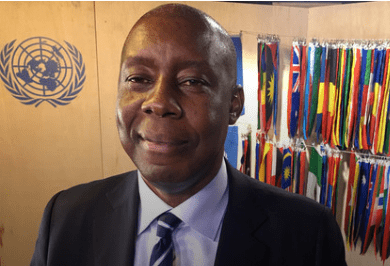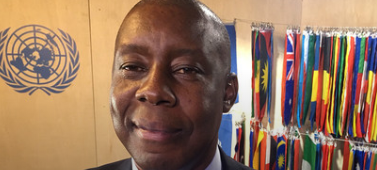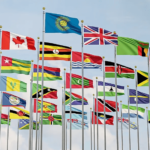Theko Tlebere
The recent elections for the Secretary-General of the Commonwealth have concluded, with Lesotho’s candidate, Joshua Phoho Setipa, facing a competitive race and ultimately conceding the position to Ghana’s Minister of Foreign Affairs. Although Setipa did not secure the seat, his candidacy highlighted a commendable effort that brought Lesotho into the global diplomatic spotlight. For a small nation like Lesotho, running for such a significant international role represents a bold step toward strengthening its diplomatic relations, reinforcing its position within the Commonwealth, and overcoming challenges within a coalition of 56 diverse member countries. In this week’s article, I intend to showcase how bold and worthy Lesotho’s candidature is even after the saddening loss.
As we all know that the Commonwealth encompasses nations across Africa, Asia, the Americas, the Caribbean, Europe, and the Pacific, making it one of the most diverse political and cultural collectives in the world. For Lesotho, presenting a candidate meant navigating a complex network of alliances, interests, and diplomatic relations among member states. This candidacy allowed Lesotho to engage more deeply with countries in various regions, not only within Africa but also beyond. Lesotho’s commitment to fielding a candidate for such a prestigious role demonstrated its willingness to bridge gaps and collaborate with both large and small Commonwealth nations, the government of Lesotho should be commended for endorsing Setipa’s candidate.
Given Africa’s significant representation in the Commonwealth, Africa was a natural source of support for Setipa’s bid yet we had three candidates. However, Lesotho also extended its diplomatic outreach to Caribbean nations, South Asian countries, and even Pacific island states, each with distinct political priorities and regional interests. Engaging with these blocs enabled Lesotho to promote its candidate on a platform of unity, emphasising shared values such as democracy, human rights, and economic cooperation.
Setipa’s campaign presented both opportunities and challenges for Lesotho’s diplomacy. The Commonwealth’s 56-member body comprises a wide array of regional alliances and interests, many of which can conflict with or complement each other in unique ways. For instance: African and Caribbean bloc diplomacy: Africa and the Caribbean, both significant blocs within the Commonwealth, often maintain strong alliances based on historical ties. However, political dynamics among member nations in these regions can be complex. Lesotho had to navigate these relationships carefully, ensuring that Setipa’s candidacy was viewed as beneficial for both African and Caribbean interests, yet Lesotho still lost.
Balancing relations with the South Asian region was critical for Lesotho: countries like India, Pakistan, and Bangladesh wield considerable influence within the Commonwealth. Nonetheless, their diplomatic and political priorities may differ sharply, reflecting the complexities and varied interests present in international relations. By promoting Setipa, Lesotho actively engaged with these nations, emphasising the mutual benefits of a Commonwealth that recognises and values the contributions of smaller states in shaping global leadership. This approach did not only cultivate stronger ties but also fostered a spirit of inclusivity that is essential for collective progress.
The Pacific Islands’ importance and regional unity were also vital: while Pacific island nations may be small in size, they are essential members of the Commonwealth, bringing forth unique and specific concerns, particularly regarding climate change and sustainable development. In as much as Lesotho’s campaign needed to resonate with these shared concerns to build support from the Pacific Islands, acknowledging that nations from different regions desire a Secretary-General who is acutely aware of their unique challenges and the broader implications of global issues was a huge challenge for Lesotho’s campaign. By addressing these priorities, Lesotho could pave the way for greater unity and mutual support among Commonwealth nations.
The legacy of economic considerations and power dynamics was also potent: Commonwealth member countries span a diverse economic spectrum, ranging from economically advanced nations to developing economies across Africa and Asia. Lesotho’s limited resources, particularly in comparison to wealthier members, posed a significant challenge in securing broad support within this complex network. Nonetheless, Setipa’s campaign effectively demonstrated the country’s resilience and unwavering commitment to representing Commonwealth values. This resonated with several member nations that grapple with similar economic constraints, fostering a sense of solidarity and shared purpose among those who aspire to enhance their voices on the global stage.
Lesotho’s bid yielded substantial diplomatic and developmental benefits, despite not securing the Secretary-General position. Let us make a dissection of the key gains: increased international visibility: Setipa’s candidacy significantly raised Lesotho’s profile within international circles and underscored its capabilities as an active participant in global governance. This increased visibility strengthens Lesotho’s voice on key issues within the Commonwealth and beyond, carrying long-term benefits for its diplomacy and trade relationships. Enhanced recognition can lead to more opportunities for engagement and collaboration with other nations.
Secondly, Opportunities for Future Collaboration: The campaign for the Commonwealth’s top position allowed Lesotho to engage more deeply with member states, fostering potential future partnerships that could be mutually beneficial. These emerging relationships may pave the way for economic and developmental collaborations across various sectors, including education, health, and environmental sustainability. Such connections are vital for Lesotho’s growth and development and can contribute positively to the Commonwealth as a whole.
Thirdly, the Reinforcement of Lesotho’s Political Will and Global Role: Setipa’s bid showcased Lesotho’s unwavering commitment to global leadership, signaling that the country is prepared to assume greater responsibility within the Commonwealth framework. This assertion strengthens Lesotho’s standing as a proactive player in multilateral forums, enhancing its bargaining power in regional negotiations and development projects. By positioning itself favorably within the Commonwealth, Lesotho can pursue a more influential role in addressing pressing global issues alongside its peers.
Lastly, National Inspiration and Diplomatic Skill Development: Setipa’s campaign has served as an inspiring event at home, fostering a renewed sense of national pride and bolstering belief in Lesotho’s capability to engage in high-level international roles. The enthusiasm generated by the campaign resonated deeply within the public consciousness, leading to increased civic engagement and a collective aspiration for greater involvement in global affairs. Moreover, the experience significantly enhanced the nation’s diplomatic skills, as Lesotho’s representatives participated in cross-regional dialogues, forged strategic support coalitions, and adeptly managed complex campaign logistics on an international scale. This development has not only enriched the country’s diplomatic capacity but has also sown the seeds for future international collaborations and engagements.
I wish to end it by categorically indicating that although Setipa did not secure the Commonwealth Secretary-General position, Lesotho’s participation in this contest was a commendable effort yielding substantial diplomatic, economic, and developmental returns. The campaign vividly illustrated Lesotho’s capacity to contribute to global leadership dialogues, emphasising its unwavering commitment to fostering partnerships and addressing the shared challenges facing Commonwealth nations. The valuable lessons learned from this experience will undoubtedly further Lesotho’s ambitions on the global stage, establishing a strong foundation for future diplomatic endeavors and reinforcing its role as an active participant in international affairs. Indeed it was a worthy fight. The Future is NOW!
Summary
- As we all know that the Commonwealth encompasses nations across Africa, Asia, the Americas, the Caribbean, Europe, and the Pacific, making it one of the most diverse political and cultural collectives in the world.
- Lesotho’s commitment to fielding a candidate for such a prestigious role demonstrated its willingness to bridge gaps and collaborate with both large and small Commonwealth nations, the government of Lesotho should be commended for endorsing Setipa’s candidate.
- In as much as Lesotho’s campaign needed to resonate with these shared concerns to build support from the Pacific Islands, acknowledging that nations from different regions desire a Secretary-General who is acutely aware of their unique challenges and the broader implications of global issues was a huge challenge for Lesotho’s campaign.

Your Trusted Source for News and Insights in Lesotho!
At Newsday Media, we are passionate about delivering accurate, timely, and engaging news and multimedia content to our diverse audience. Founded with the vision of revolutionizing the media landscape in Lesotho, we have grown into a leading hybrid media company that blends traditional journalism with innovative digital platforms.









